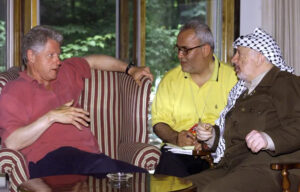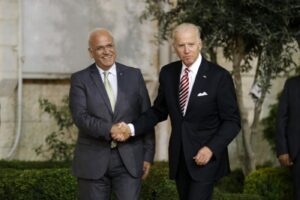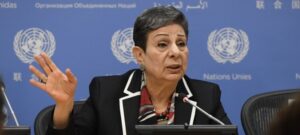by Miceál O’Hurley
DUBLIN — Saeb Erekat, the veteran Palestinian negotiator and universally recognised advocate of peace, has died at Intensive Care Unit of Hadassah-University Medical Center – Ein Kerem, Jerusalem. He was 65. Erekat is survived by his wife, two sons, twin daughters and eight grandchildren.
The Fatah Party announced his death citing his battle with Covid-19 only two years after receiving a lung transplant. Erekat was transported to hospital from his home in Jericho on 8 October in critical condition and was almost immediately intubated. According to a media release from Hadassah-University Medical Center, during the course of his hospitalisation, Erekat received intensive treatments, including being connected to an extracorporeal membrane oxygenation (ECMO) life support machine. Throughout his hospitalisation groups of Israelis sustained a protest outside of the medical centre demanding he be denied even basic medical care in Israel.
Foreign Minister Simon Coveney Expresses Ireland’s Sympathies

Irish Minister for Foreign Affairs, Simon Coveney, T.D. released the following Statement upon learning of Erekat’s death:
“It is with great sadness that I heard of the death today of Saeb Erekat, Secretary General of the PLO and Palestinian Chief Negotiator.
Dr. Erekat was a leading voice for Palestinians and for peace. His willingness to engage and talk when it was not always easy or popular was a clear demonstration of his belief that through dialogue and negotiation, even the most difficult issues could be resolved. His contribution to peace, including the Oslo Peace Process, is testament to that.
I met with Dr. Erekat on many occasions during my visits to the region and in Dublin, when he accompanied President Abbas on his visit in 2018. We spoke regularly and I was always impressed by his commitment, which we share, to a just and lasting peace. While Dr. Erekat’s vision for peace was not achieved during his lifetime, it is for all of us in the international community to honour that commitment by working together for a pathway for peace in the Middle East.
I would like to extend my sympathies to his family and friends at this very difficult time, and to the Palestinian community in Ireland who will mourn his loss.”
Leaders Mourn a Brother and Public Servant in the Palestinian Territories and Ireland
Around the globe, world leaders expressed condolences to the Erekat’s family and the Palestinian people on the loss of a staunch advocate of peace and the ‘Two State Solution’ (creating an independent Palestinian state alongside Israel to end the Israel-Palestinian conflict) to which both Israel and the Palestinians committed themselves through the Oslo Accords in 1993.
From the Palestinian Territories, President Mahmoud Abbas declared three-days of national mourning, describing Erekat as both a “brother” and a “fighter.” He added that Mr Erekat “will be remembered as the righteous son of Palestine, who stood at the forefront defending the causes of his homeland and its people.” Mr. Abbas said flags will be flown at half-mast throughout the mourning period.

Her Excellency Dr. Jilan Abdalmajid, Ambassador of the Mission of the Palestinian State in Ireland, expressed her sympathies and condolences on her esteemed colleague’s death, “The Mission of the State of Palestine send our sincerest condolences to the family and friends of Dr. Saeb Erakat who has passed away from Covid-19 at the age of 65. Sympathies also to President Abbas and the Palestinian people. Dr. Erakat lived a life committed to peace, justice and Palestine and will be sorely missed.”
World Expresses Condolences
The Royal Hashemite Court tweeted, “His Majesty King Abdullah II, in a phone call, extends condolences to Palestinian President Mahmoud Abbas, over the passing of Saeb Erekat, the secretary-general of the Palestine Liberation Organization and member of the Fatah Central Committee,” expressing the sympathies of Jordan’s King Abdullah II.
Egypt’s Foreign Minister Sameh Shoukry also extended his condolences and sympathy to Erekat’s family and the Palestinian leadership and people over Erekat’s loss, “The Palestinian cause and the entire Arab world have lost a steadfast patriot, who had clear and legitimate case and goals. Erekat has devoted his life to defending [the cause] through all diplomatic and negotiated means in order to restore the rights of the Palestinian people despite of the obstacles and difficult circumstances faced by the Palestinian cause in the past decades,” the statement said. He added that Erekat’s name will remain a “beacon and symbol for honorable resistance and the Palestinian national project.”
Arab League Secretary-General Ahmad Aboul Gheit mourned the death of Erekat, whom he eulogized for his “national positions in the service of the just Palestinian cause.”
The United Nations Special Coordinator for the Middle East Peace Process Nickolay Mladenov also paid tribute to the veteran negotiator, “I extend my deepest condolences to the family of Saeb Erekat and the Palestinian people,” Mladenov wrote on Twitter. “You remained convinced that Israel and Palestine can live in peace; never gave up on negotiations; and stood proudly for your people! We will miss you, my friend. May you rest in peace!”
European Union foreign policy chief, Josep Borrell, also mourned Erekat saying, “His passing away represents a great loss for the Palestinian people and for the Middle East peace process. During his life, Saeb Erekat tirelessly sought to fulfill the legitimate aspirations of his people. As a key participant to the negotiations for the Oslo Accords, he always advocated a just and lasting negotiated two-state solution to the Israeli-Palestinian conflict. He personally contributed to developing close relations between the EU and Palestine. I am grateful to him for his contribution in this regard,” said Borrell, extending “my heartfelt condolences to his family, to the Palestinian Liberation Organization and to the people of Palestine.”
UK Foreign Secretary Dominic Raab called Erekat a “champion of dialogue and Palestinian rights.” “I am saddened to hear the news of his tragic passing,” he added. Former Prime Minister Tony Blair hailed Erekat as a “legendary negotiator, aware of every intricacy and detail of the ‘two-state solution’ and a tireless advocate of it .”
From Israel, dissenting politicians such as Tzipi Livni, the former Israeli foreign minister who negotiated with Erekat in the 2000s, said she was “saddened” by his death adding that he had texted her after falling ill, saying “I’m not finished with what I was born to do.” Yossi Beilin, a former Israeli Cabinet minister and peace negotiator, called Mr Erekat’s death “a big loss for those who believe in peace, both on the Palestinian side and the Israeli side.” As of the time of reporting, there was no word from Prime Minister Benjamin Netanyahu on Erekat’s death.
Who Was Saeb Erekat?

Saeb Erekat was born in Jerusalem in 1955 but grew up in Jericho. In 1972, he earned both a bachelor’s and master’s degrees in international relations from San Francisco State University in the United States. After graduation he returned to the West Bank to teach at Al-Najah University in Nablus, before winning a scholarship to do a Ph.D. in conflict resolution and peace studies at the University of Bradford in the United Kingdom.
After defending his thesis in 1983, now Dr. Erekat began writing for the Palestinian newspaper al-Quds. A constant theme of Erekat’s journalism entailed promoting dialogue between Palestinians and Israeli academics. Erekat was renown for creating controversy for having invited Israeli students to attend his lectures at al-Najah, something he felt necessary to promote a better dialogue with young academics and Israelis in general.
Plying his doctorate in conflict resolution, Erekat was tapped by the late Palestinian leader Yasser Arafat to be vice-chair of the Palestinian delegation to the Madrid Conference, an precedent setting summit between Israel and its Arab neighbours. Erekat helped negotiate the landmark 1993 Oslo Accords that saw the creation of the Palestinian Authority and gave Palestinians limited self-governance in the West Bank and Gaza Strip for the first time since Israel occupied the territories in 1967.
Unfulfilled Promise of Oslo Accords

Despite encouragement from the international community, the goals of the Olso Accords went unfulfilled. The Israeli commitment to a comprehensive peace agreement to give full implementation of the Two State Solution within 5-years vanished. Following the Gaza–Jericho Agreement and prior to the first Palestinian Authority elections, Israel did withdraw from Jericho and most of the Gaza Strip in 1993. In accordance with the Hebron Protocol, Israel withdrew from 80% of Hebron in January 1997. However, negotiations stalled and further withdrawals did not occur, leaving the ‘final status’ mandate unfulfilled.
In October 1998, the Israel and the Palestinians signed the Wye River Memorandum, promising resumption of the withdrawals but only the first stage was ever implemented. With Israelis Prime Minister Benjamin Netanyahu facing internal opposition from within his own cabinet, additional withdrawals were deferred by Israel indefinitely. The issue of Israel improving settlements while demolishing Palestinian homes and property, as well as arrests of Palestinians who were held without charge, accusation of Palestinians being tortured and denied access to basic legal assistance exacerbated by Israel invoking military law on civilians continued to inflame the region. During the Second Intifada (2000-2005) the Israeli military re-occupied many of the areas previously turned over to Palestinian control in contravention of its previous commitments. The military occupation of the Palestinian Territories continues to this day despite widespread condemnation.
Enduring Commitment to Oslo Accords and Peace

Erekat was a key player at the Camp David summit with Arafat in 2000. He also represented the Palestinians at the Taba Negotiations in 2001. After the death of Yasser Arafat in 2004, Erekat assisted the new Palestinian President, Mahmoud Abbas, at the Annapolis Conference in 2007. None of these meetings attained an agreement concerning the ‘final status’ promised by the Oslo accords. Issues such as borders, Jerusalem and refugees continued unresolved.
Erekat was more than a negotiator and advisor to Palestinian leaders. He served as a minister for local government in the Palestinian Authority and represented Jericho in the Palestinian Legislative Council. Erekat was elected to both the PLO Executive Committee – and the Central Committee of Mr Abbas’ Fatah movement in 2009. He became the PLO’s secretary general in 2015.
Erekat Still Active Until Just Before His Death

Erekat remained an ardent promoter of the Two State Solution despite Israel’s occupation of the Palestinian Territories and a history of human rights abuses suffered by the Palestinian people. During the Trump Administration, Erekat decried the retreat of the White House’s historic commitment to a Two State Solution and a Middle East peace that kept the Palestinians at its centre. After Trump moved the US Embassy in Israel to Jerusalem, breaking a long-standing tradition of not taking sides on the unresolved issue of Jerusalem, Erekat proclaimed the US was, “part of the problem and becoming more irrelevant in the Middle East.” After Trump sought to ‘normalise’ relations between some Arab States and Israel, Erekat declared the move to be tantamount to “a killer to the two-state solution.”
Epitath

Erekat’s long-time collaborator, colleague and friend, Palestinian Hanan Ashrawi, a member of the PLO executive committee, wrote on Twitter about his passing representing a “significant transition in Palestinian history and reality. He was firmly committed to his people’s rights, unwavering in his pursuit of a just peace, and totally undaunted in his quest for freedom and rights.”
In the final analysis, Saeb Erekat’s life-long labour for peace may not have been fulfilled in his lifetime, as reflected in his message to his former Israeli negotiating partner, Tzipi Livni, Erekat’s near-deathbed text proclaimed, “I’m not finished with what I was born to do“. Combined with the sincere outpouring of grief expressed from within the Palestinian Territories and around the globe, an impression is created that his legacy of working towards a peace rooted in a Two State Solution will live on in the memory of people of good will who continue to dream and work towards a peace with justice, dignity and equality through the conclusion of a ‘final status’ agreement between Israel and the Palestinians.
_____________________________
Nota Bene: Dr. Saeb Erekat’s name can be variously spelled in translations: Saeb Muhammad Salih Erekat (also Erikat or Erakat or Arekat; Arabic: صائب محمد صالح عريقات Ṣāʼib ʻUrayqāt or ʻRēqāt).














































